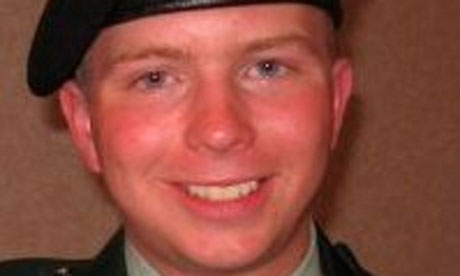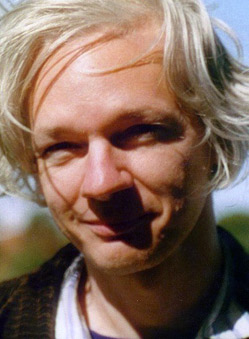Assange begins mansion arrest, but his 'source' feels the heat
The Independent, 18 December 2010Bradley Manning spent yesterday, his birthday, alone in a tiny, bare prison cell, without a pillow or sheets on his bed, in weak health and wracked with anxiety at the prospect of a prison sentence of 52 years.
 |
 |
The young American soldier has faded into the background as international ructions continue over the hundreds of thousands of pieces of classified material from the US government that he is supposed to have supplied to WikiLeaks.
Now the fate of the whistleblowing website’s founder, Julian Assange, who has very much held the centre-stage, lies in the hands of the 23-year-old former army intelligence analyst.
Yesterday US sources revealed that prosecutors are awaiting a decision from the American Attorney-General, Eric Holder, on what form of plea bargaining they should offer to Manning in return for him incriminating Mr Assange as a fellow conspirator in disseminating the classified information.
Officials at the US Justice Department, who are under acute pressure to prosecute, privately acknowledge that a conviction against Mr Assange would be extremely difficult if he was simply the passive recipient of the material disseminated by Private Manning. Any evidence that he had actively facilitated the leak, however, would make extradition and a successful case much more feasible.
Friends of Private Manning stress that so far he has refused to co-operate with the prosecutors. However, they also say that after seven months of solitary confinement in at the Quantico Marine Base in Virginia he is in an increasingly fragile condition. He is charged with leaking a US military video showing a 2007 attack by Apache helicopters that killed 17 people in Iraq including two Reuters employees.
Yesterday, speaking the morning after his release on bail of £240,000 as he fights the extradition request from Sweden for alleged sexual offences, Mr Assange insisted: “I had never heard of the name Bradley Manning before it was published in the press. WikiLeaks technology [was] designed from the very beginning to make sure that we never know the identities or names of people submitting us material. That is, in the end, the only way that sources can be guaranteed that they remain anonymous.”
But Adrian Lamo, a former hacker who had been in contact with Private Manning and eventually turned him in to the government, has told the FBI that Mr Assange had given the young soldier an encrypted internet conferencing service as he was downloading government files and a dedicated server for uploading them to WikiLeaks.
Mr Lamo claims that Private Manning had “bragged” about this to him. In one email, now in the possession of the Justice Department, the soldier allegedly wrote: “‘i cant believe what im confessing to you?im a source, not quite a volunteer, I mean, im a high profile source? and I’ve developed a relationship with assange.”
David House, a computer programmer who visits Private Manning in prison, said in an interview: “Over the last few weeks I have noticed a steady decline in his mental and physical wellbeing. His prolonged confinement in a solitary holding cell is unquestionably taking its toll on his intellect; his inability to exercise due to regulations has affected his physical appearance in a matter which suggests physical weakness.”
The authorities had initially stated that Manning was being kept in solitary confinement for his own safety. Friends like Mr House now believe it is being done for punitive purposes and to exert pressure on his vulnerablities.
Mr House said: "As time passed and his suicide watch was lifted, to no effect, it became clear that his time in solitary - and his lack of a pillow, sheets, the freedom to exercise, or the ability to view televised current events - were enacted as a means of punishment rather than a means of safety."
Private Manning had downloaded the files subsequently sent to WikiLeaks while serving with Operation Station Hammer in Iraq. He put the classified material onto a Lady Gaga CD, with the music wiped out, while pretending to lip-sync to tracks.
Private Manning described described lax security where “everyone just sat at their workstations? watching music videos, car chases, buildings exploding, weak servers, weak logging, weak physical security, weak counter-intelligence, inattentive signal analysis?a perfect storm.”
His emails also reveal that he was emotionally fraught after breaking up from a gay relationship. In one email to Mr Lamo he wrote: “i'm a wreck.i just wanted to be nice, and live a normal life...but events kept forcing me to figure out ways to survive. ive been so isolated so long...im self medicating like crazy when im not toiling in the supply office.’’
Robert Feldman, a US lawyer specialising on security issues, said: “We kind of have a picture of a troubled young man with obvious problems. Yet no one in the Army system picked this up and he was allowed access to secret information. And we also see security around the place was pretty loose.
“So a trial would be embarrassing to the DoD [Department of Defence] whatever happens. But, if they can prove complicity in the part of Assange in organising the leaks, then a picture can be drawn of an Assange, an older man, who manipulated an emotionally disturbed younger man. But to do this they obviously need evidence of complicity.”
Mr House claimed that friends of Private Manning have become apprehensive of speaking up for him because of systematic harassment by law enforcement agencies. Mr House, 23, said that he and his girlfriend were detained for questioning by Homeland Security officials on their return from a holiday in Mexico and all electronic items in their possession seized.
Mr Assange said his American lawyers have told him that a grand jury has been secretly empannelled in Alexandria – the US Justice department has refused to comment on the claim. And, in what is seen as the determination of the authorities to pursue a prosecution, a number of hackers have claimed they have been offered financial inducements in return for associating with WikiLeaks and gathering evidence of wrongdoing.
One computer specialist told the Washington Post said the US Army offered him money to “infiltrate” the website, but he turned it down because “ I don’t’ want anything to do with cloak and dagger stuff.” An Army criminal investigation division spokesman told the newspaper “We’ve got an ongoing investigation.We don't discuss our techniques and tactics."
Opinions on whether Mr Assange should be prosecuted differs among public figures in the US. Former federal attorney general Kenneth Wainstein said that the Justice Department “should be able to make a clear distinction between WikiLeaks and traditional media outlets. By clearly showing that WikiLeaks is fundamentally different the government can demonstrate that any prosecution here is not the sign of a more aggressive effort against the press.”
But House Judiciary Committee chairman John Conyers Jnr, said: “When everyone in this town is joined together calling for someone’s head, it is a pretty strong sign we need to slow down and take a closer look? Many feel that the WikiLeaks publication was offensive. But being unpopular is not a crime and publishing offensive information is not either.”